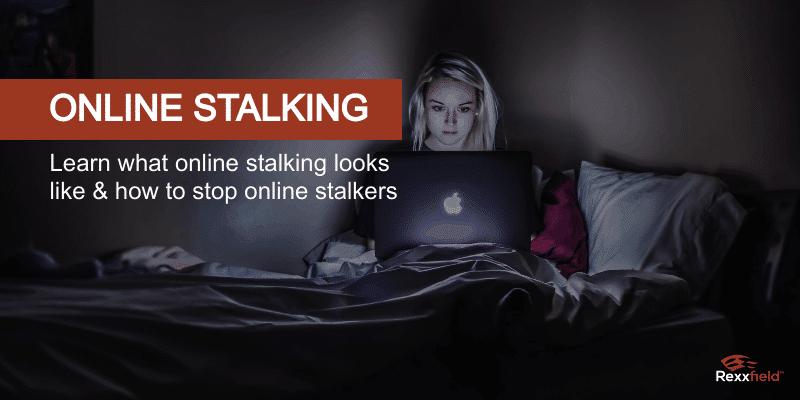Online stalking is becoming more common and dangerous. According to the Stalking Resource Center, over 7 million adults become victims of stalking on the internet every year. During COVID-19, we saw a significant increase in people reaching out for help to stop an online stalker and end harassment.
Enduring this harassment is disrupting and exhausting. It is frightening, often leaving victims with significant psychological trauma.
What is online stalking?
Online stalking is where someone or a group uses the internet to stalk another person. Being stalked online can take many different forms: identity theft, online threats, slander, spreading false rumours or accusations, or following someone’s every move online. We will name some examples of cases we have seen later.
Online stalkers use different tactics and employ a wide variety of tools. 83% of cyberstalking victims say that they were being stalked through email. Another 35% were stalked through instant messaging, such as texts. Another common harassment tool we see is social media, where stalkers closely follow someone else or spread false rumours or post threats.
Online stalking behaviour can include:
- Impersonation or spreading rumours
- Posting embarrassing, or intimate videos, photos, or comments about you
- Sexual blackmail (sextortion)
- Continually messaging, emailing, or texting you to intimidate you
- Harassment on social media like Facebook, Twitter, and dating/chat/games sites, and apps.
Online Stalking Examples
We deal with online stalkers every day to bring some relief to our clients who are harassed, threatened, and scared. These are some of the most common cases we see:
The stalker always tries to find new ways to get you to respond, even when you repeatedly ignore their efforts.
For some stalkers, stalking is a substitute for a relationship. They want your attention at all times. When they get the desired attention, they are happy. When you stop and ignore them, their stalking will increase and turn ugly. Victims have described this to us as mental rape because they are forced to engage with someone against their will.
The online stalker also bothers your friends, family, and/or workplace.
Stalkers are obsessed and fixated on you and your life. They look at your social media and online activity numerous times a day. Often, they will look at your friends’ social media to get more insight and information about you. They will contact your friends and family to a) pretend they are worried about you or b) humiliate you in some way to hurt you. Or they start stalking friends and family to get your attention and force you to respond.
We also see cases where the stalker contacts the victim’s workplace and spreads false or malicious information to damage the victim’s career.
The online stalker hacks your email, profile or phone, to access your personal information.
Cyberstalkers spend hours thinking about their victim, fantasizing, and trying to get access to your online accounts. They want access to gain control over you, know everything about you, or extort you.
To prevent them from gaining access, never use the same password and update your password regularly. Set up two-step authentication on all your online accounts, especially your email and phone. Also, install antivirus software that features anti-spyware protection.
The stalker knows more about your whereabouts than most people would.
We hear from victims all the time that they feel that their stalker knows exactly where they are, all the time. If they indeed always know where you are, which street, at which time, then you might search your car for a GPS tracker. These GPS trackers are available online for just $40, and by just sticking one on your car, you can be tracked at any time.
In some cases, the online stalker pretends to know where you are to make you feel scared.
Who is most affected by online stalkers?
Advocacy group Working to Halt Online Abuse (WHO@) posted statistics on cyberstalking and online harassment. According to these statistics, victims being stalked online are spread evenly across all age groups. Most of them are white females, but the number of males being stalked has almost doubled in the past decade. Additionally, the number of Asians and African Americans affected by online stalking grows every year. It is estimated that 1 in 12 women in the US has experience with online stalkers, either online or offline. In most cases, people being stalked online know their perpetrator. Almost 75% of victims know their online stalkers in one way or another.
The pervasiveness of the internet and other technological advances made it possible for anyone to be stalked on the internet. Whether you’ve drawn the wrath of a disgruntled former employee or separated from your partner, it’s easier than you may realize to become a victim to one of these online perpetrators. That is why you need to take action to prevent and stop cyber harassment in any shape or form.
How to stop an online stalker
First, if you fear for your safety at any point, immediately contact law enforcement.
Secondly, you need to keep evidence of all incoming messages, emails, texts, voicemails, etc.
Then you should tell your stalker to stop but only do this once. After telling them to stop, you should stop responding to any messages thereafter. If you keep engaging, you will give the stalker exactly what he or she wants. Negative attention is still attention.
Ask local law enforcement for help.
If you know who the stalker is, your local law enforcement agency should be able to assist. Send your evidence of the stalking to law enforcement and ask for a restraining order.
Identify the online stalker
In most cases, the stalker is anonymous, hiding behind proxies and fake profiles. Even if you have a suspect or no who it is, you still need proof. Because of the anonymity that the internet allows, identifying online stalkers is challenging.
Our online investigators can identify anonymous users online, on websites, social media, emails, texts, etc.


